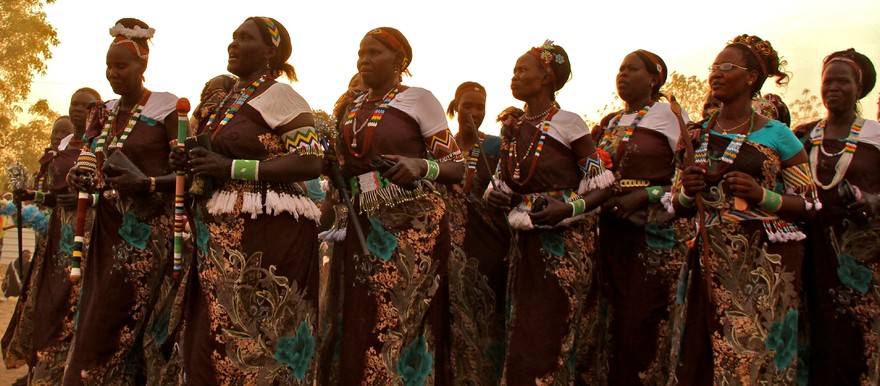Shilluk king ‘hasn’t blown whistle to arms’

Malakal’s Souq al-Kabir has long been a meeting point for the several tribes that make Upper Nile State their homeland. Dinka, Nuer and Shilluk alike go about their business peacefully, perpetuating a long history of collaboration and cohabitation.
The state’s three main tribes intermarry and offer one another grazing and fishing rights in their own respective territories. Formerly peaceful relations, however, have grown increasingly strained between the Shilluk (also called Chollo) and their Dinka neighbours since the 2011 independence.
There are some in the state capital who perceive the central and state governments as ‘tribalized’ and sense that decisions are made on behalf of particular interests rather than the whole public. The governor recently responded by tasking a committee to investigate and restore lands allegedly encroached from the Shilluk.
Angelo Othow Nyikang, a former politician and a civil engineer by trade, has written about the history of the Shilluk and their kings. He explains that the present king has decided to maintain peace with the government in spite of the elevated tensions. He tells Radio Tamazuj that people are praying for change, but adds that ‘force is not the solution.’
Interview transcript:
Mr. Nyikang, how have the relations evolved between the Shilluk people and their king during the war and since independence? Since you now have the payam, and the governor and the president in Juba, is the king still able to maintain his authority over his people?
The Chollo king is very powerful within his jurisdiction. He is empowered. He is an administrator, a commander in chief and a spiritual leader to us, so he is listened to. He can save people from war and provoke war - that is within his powers. Like now, there is an encroachment of Dinkas within Shilluk land, but since the king hasn’t blown the whistle to take arms and defend the land, people think: “OK, since there is a government, this can be solved”. It’s not like so long ago when you fought with sticks and spears, but now with rifles... So, he hasn’t yet taken this step, but it is within his powers to tell his subjects, the Shilluk, to do whatever he thinks is right to undertake. And Shilluks now regret the fact that so many things are happening and that the order hasn’t been given to act otherwise.
Do national politicians have to be careful in the way they interact with the king, because he could still ‘blow the whistle’, as you say?
Blowing the whistle is separated from politicians because politicians belong to another section of the rule. He is thus also careful not to intervene with the government position. What is good is that he is giving powers from the start, within his territory.
Because if the king was to go directly against the governor or the government, he could lose his powers, perhaps?
This tension is avoided since the Shilluk administration has been endorsed in books as the best system of governance and this situation is being watched carefully by the government and the king, in order not to hamper all the credit that has been given to the royal system of the Shilluk.
You were talking earlier about encroachment of Dinkas and Nuers over the Shilluk Kingdom. Can you elaborate?
Encroachment of the land actually... we used to have common borders with them during the British time and Sudan. The complaints of encroaching... when these complaints were raised to the government in Juba, all that was decided was to send surveyors to establish the limitations. But recently, the government of Salva Kiir declared that this part that has been claimed by Dinkas for a long time would belong to the Dinkas and he annexed it to Jonglei, which is a different State. So nothing is being done. But we complained. If the borders have to be reinstated to 1956 - the time of independence - we hope that we will gain our territories back. Again, in the northern part of the kingdom, in a place called Kogo, the Dinkas and the Shilluk got intermarried because the dowry is lower with the Shilluk. So they married with our daughters and they stayed there. Now the sons of our daughters are claiming the land, which did not belong to them. They came before independence, they burnt Shilluk villages along the East Bank and until now, the Shilluk haven’t been able to move back. That is encroachment. We hope that the government will reinstate the borders of 1956. But now, the land is being occupied by the Dinkas - which used to be our ancestral land. And they want to drive us to the West bank.
Is it possible to build a stronger sense of national unity among decision-makers?
When any epidemic besets the nation, people pray for change. Things come and things go. People hope that better change will come. How it will come, this is a dream and a prayer, perhaps. People hope that bad governance will change into good governance… After two, three years, there will be elections. It will either bring bad ones or good ones. But we hope for a good one. Because force is not the solution.
Photo: Chollo dancers at a wedding in Malakal (Radio Tamazuj)